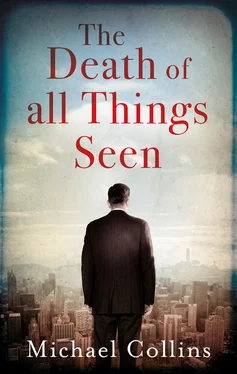Nate had grown. His hair was long. He had the beginnings of a goatee beard. He was wearing bell-bottomed pants with a hip-hugger waist and a paisley shirt.
It was one of the few times that Nate had ever seen Helen Price. Below, he saw her leave in the crescent arc of the circular drive in his father’s car. His father was that loaded he hadn’t been able to drive.
His father insisted on being introduced to the duchess. He was aggressive and lurching in his advance.
Janice Marsh hardly understood what he was saying. She looked for her coat.
Nate’s father had a bottle of Scotch in his hand. Nate reached out to steady him. His father swung wildly. He would not be handled, not by his goddamn son ! It was the most awful Nate had ever seen him.
Janice Marsh let out a squeak like a mouse. With her books clamped to her chest, she was the very picture of what men were fighting so hard to keep safe.
Then Nate’s father wanted to shake Nate’s hand in a sudden shifting reconciliation in the way a drunk might advance and retreat on an argument. There was no call for language like that. He was sorry. He insisted Janice stay. He wanted her to hear what he had to say.
Nate stood protectively by Janice.
His father blocked the stairway. He set his Scotch on a step beside him and began to show them how you strangled someone. He had strangled more than one gook with his bare hands. That, he said, was what hand-to-hand combat was about, his hands still around the throat of an invisible enemy. The Japs, they had to be flushed island-by-island during the push through the fortified caves of Saipan and the lesser islands along the Marianas archipelago, the weapon of choice — the flamethrower.
He took a long drink, one foot on the step above. He had seen GIs bleeding out on the hillside quagmire of godforsaken islands, heard the murmuring phantasmagoria of the rumored kamikaze attacks that had sent a thousand souls into the listless blue of the Pacific to endure insufferable thirst and the circling menace of sharks.
He said how he’d seen armies of crabs with the faces of Samurai warriors pouring onto the beaches, as though the enemy they’d killed was coming back again and again.
What he said he learned in the atolls was that people fought hardest for the things they didn’t believe in because there was no alternative. Kamikaze attacks and ritual hara-kiri, the war in the Pacific was nothing like the known terror of the Nazis with their Lebensraum . The Pacific theater of war was a journey into the vegetative tangle of nameless archipelagos of what should have been Paradise Found, with its parrots, palm trees, and eternal sunshine, when what it had ended up being was a proving ground for obliteration.
He explained why they took so few prisoners. The Japs wouldn’t submit to surrender. They fought to the death, so the bomb had to be dropped on them. There was no other way. They had to be brought to their knees. Each American fighting had that settled in their hearts. They had nothing in common with the Japs. Independent thinking was an alien concept to them. They were bound to their imperial emperor, to collective ceremony and tradition. America with its democracy and convertibles offered them nothing. Their understanding of Uncle Sam was all pin-up girls and Coca Cola.
*
Nate’s leaving party was in the carriage house two weeks later in the détente that nothing could be said between him and his father. Nate was served papers to appear for active service at Fort Pendleton out in California. He avoided his mother for her betrayal.
He stayed at the college in the dorm room of a friend in advance of leaving. His going away party was a divided gathering. Present at the party were those who supported Nate and supported the war versus those who supported Nate but not the war.
What they all shared though was a feeling of awe for this young man who was willing to lay his life on the line.
Nate’s father came out toward the end unannounced. This was how the carriage house should have been lit up every weekend. He moved through the throng, amidst the smell of pot and the sweet odor of keg beer, amiable, cordial and convivial. He called the girls Duchess . They thought he was charming, or they lied and said so.
Then the speeches started, the eulogies, his father staring over the rim of his glass. His eyes were locked on Nate. It was apparent then, what his father would do, that he would eventually intervene. It was what Nate had subconsciously hoped.
But just then there had been a charade to uphold, and if Nate had not succeeded in high school, if he was never captain of the football or hockey team, if he played lacrosse, and played it badly, here was a moment when girls might later name their son after him, remembering him for the innocence of a boy who had stepped forward, when nobody in school had looked closely at how brave Nate Feldman really was.
*
Nate looked up. His breath frosted in the coldness. He was standing vigil to a pile of bones six feet beneath the ground. He had been a day and a half in America, and there were things still to be settled, not just with the dead, but with the living.
Back in his car, Nate took out his phone. He could not bear to call Norman Price.
Instead, he wrote a brief email.
I am contacting you on the off-chance you might remember Mr Theodore Feldman as longtime employer of your mother. I should be delighted to make your acquaintance if you have the time.
THEY WERE ANTICIPATING a mid-morning departure for the journey out to Norman’s home to view and appraise a property that wasn’t moving in the doldrums of the post-financial crisis. Credit had dried up. He described it on the white board as a case of perceived value not equaling purchase price, or pv ☹ pp .
It was a small miracle getting ready, what with the issue of Randolph obstinately refusing to go into his cage. Given his size, there was something grotesque about the entire operation.
Joanne moved in the harried clip clop of her heels. In a flounce of blouse, she looked like a buccaneer. She wore a push-up bra. Her cleavage showed. She leaned and waved a newspaper squeak toy encouragingly under Randolph’s nose to lure him into his cage. It didn’t work.
Exasperated, she dropped the toy and went back to working a pair of earrings into her ears. She hadn’t been out in the real world in a long time, well, not in the company of a man. She made a pout with her lips, applying lipstick and blush. She looked suddenly appealing, or more feminine, and all that she had lost was suddenly apparent.
Norman might have said something kind, but decided against drawing attention to the situation. Joanne was up on her toes in her high heels. Along the back of her left thigh where it widened above her knee, there was a run in her tights. He decided not to mention this either, while Grace shouted in her aggressive Chinese, her face right in Randolph’s face, in the way Chinese did not yield personal space. She left momentarily and reemerged with a naked Barbie doll.
It did the trick. Grace talked to Randolph, and then to the doll, as though it was necessary and unavoidable, like how a general might speak to his troops on the eve of some futile battle. Randolph entered the cage, the quarry of the Barbie between his slobbering jowls.
On the way out the door, in the turn of the double-lock bolt, Norman was suddenly aware of the disconcerting sound of crunching and snapping plastic.
*
Norman’s driver’s license had expired. It had escaped his attention until they were downtown before the Hertz agent. Joanne had a license, but, embarrassingly, all four of her credit cards were maxed out. She set them down, one at a time, like a bad poker hand, before a tanned, buff assistant manager in the corporate yellow of a Hertz polo shirt that made him look gay, even if he wasn’t, which he was. Norman was sure of it.
Читать дальше












